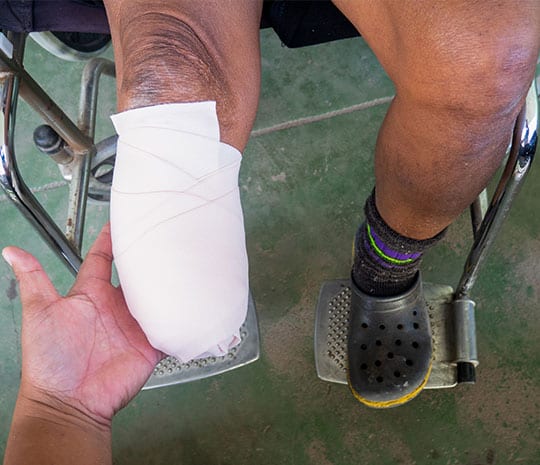Catastrophic Injury Lawsuits
At McIntyre Law, we approach each catastrophic injury case with extreme care, because catastrophic injuries can leave a victim unable to work and with a lifetime of needs. It takes an experienced personal injury lawyer to determine how those needs will change over a lifetime. Your catastrophic injury could be manageable now, but can affect you in ten or twenty years in ways you don’t realize today. As catastrophic injury lawyers, we carefully evaluate the total life circumstances of a victim to determine what should be done to provide for the best possible care for as long as necessary. Don’t hesitate to call us if you need a Spanish-speaking lawyer that can further help with your case.
Call us to start your catastrophic injury lawsuit today.

What is a catastrophic injury?
An injury is classified as a catastrophic injury when it leaves the victim needing life care assistance, vocational rehabilitation, nursing care, or assisted living care.
Types of Catastrophic Injuries
Catastrophic injuries that often result in compensation for the victim include:
- Severe burns
- Traumatic brain injuries
- Internal organ damage
- Amputations
- Spinal cord injuries
- Paraplegia
- Quadriplegia
- Blindness/Deafness
- Carbon monoxide poisoning
- Swimming/Drowning
Causes of Catastrophic Injuries
Catastrophic injuries can be the result of a car accident, trucking accident, animal attack, motorcycle accident, medical negligence, slip and fall, near drowning or any other type of accident that leaves you or a loved one needing a lifetime of care.
The catastrophic injury cases we specialize in are:

Aviation Accidents

Car Accidents

Oil Field Accidents

Trucking Accidents

What to Know Before you File a Lawsuit
If you or a loved one has suffered a catastrophic injury, you may need to acquire medical records, accident reports, or death records. You’ll also need to fill out other legal paperwork such as subpoenas and court petitions. McIntyre Law can help you through the process. We will listen to your story and use it to file a catastrophic injury lawsuit that is prepared correctly and delivered on time.
Some people want to handle their catastrophic injury lawsuit on their own. They don’t realize they are often signing up to go against experienced lawyers from insurance companies or big corporations. You need an experienced lawyer on your side to get the compensation you may be entitled to.
What is a contingency fee?
When a lawyer works on a “contingency fee” basis, they’re agreeing to accept a fixed percentage of any monetary rewards from your lawsuit to cover their legal fees. If there are no rewards from your car accident lawsuit, you don’t pay the lawyer. We get paid if, and only if, you do.
The Statute of Limitations for a Catastrophic Injury Lawsuit
The statute of limitations for filing a catastrophic injury lawsuit varies from state to state. We can help you find out whether you have the sound legal standing to file a catastrophic injury lawsuit.

Working with McIntyre Law
Families deserve compensation to cover the cost of care and lost income that can last for decades. If you have been injured, a catastrophic injury lawyer can provide valuable tools for making sure you or your loved one is cared for in the future. McIntyre Law has leading professionals on standby to ensure that proper life care needs are addressed that protect both the victims and their families.
When you work with McIntyre Law, you’re getting an experienced team of law professionals who want to make sure you’re equally represented in your catastrophic injury lawsuit.
Meet Our Catastrophic Injury Attorneys Attorneys
Our experienced catastrophic injury lawyers are ready to help you get the compensation you deserve.

Noble McIntyre

Jeremy Thurman

Jordan Klingler

Monica Schweighart

Brenda Gómez O’Dell

Sarah Ramsey

Mario D’Angelo, Esq.

Daniel Zonas
Do you have a case for a catastrophic injury lawsuit?
Catastrophic injuries could mean that you might not be able to live independently, so the human tragedy behind catastrophic injury accidents can be far-reaching. You may be entitled to compensation to cover these costs. One call to McIntyre Law will get you access to our catastrophic injury experts. Filing a lawsuit is worth the effort, because it means you’ll have experienced lawyers on your side, fighting for the compensation you’ll need for the rest of your life.

What compensation can I get from a catastrophic injury lawsuit?
Catastrophic injuries can leave the victim unable to work. Even worse, they could leave a primary caregiver unable to work due to the overwhelming demands of day-to-day care. In other words, if your family member sustains an injury that requires 24-hour assistance, or which means that the person cannot be left alone, who would care for that person while you’re at work? Now, there are two people—not just the injured individual—who are unable to maintain an income.
Compensation types include cost of care, medical bills, and lost income.

